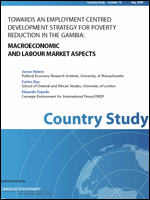Source: Carnegie Endowment for International Peace and the International Poverty CentreCountry Study
 In this paper, Eduardo Zepeda of the Carnegie Endowment, James Heintz of the University of Massachusetts and Carlos Oya of the University of London review the growth, employment and poverty record of Gambia, focusing on the macroeconomic environment and the structure and functioning of labour markets. The aim of the paper is to identify areas where current policies can be improved or where more knowledge needs to be generated to better inform inclusive development strategies.
In this paper, Eduardo Zepeda of the Carnegie Endowment, James Heintz of the University of Massachusetts and Carlos Oya of the University of London review the growth, employment and poverty record of Gambia, focusing on the macroeconomic environment and the structure and functioning of labour markets. The aim of the paper is to identify areas where current policies can be improved or where more knowledge needs to be generated to better inform inclusive development strategies.
The growth pattern of Gambia does not appear to be pro-poor, as improvements in the rate of growth appear to have at best halted the spread of poverty. Weak productivity performance and the low quality of employment help explain the poverty record. On the macroeconomic side, an excessive emphasis on inflation reduction and reliance on rudimentary monetary policy instruments have helped sustain a high-interest rate environment, which discourages investment and employment creation.
As part of an alternative policy package, Gambia could reformulate macroeconomic policies to target growth instead of inflation, select a more effective mix of policy instruments, and pursue financial reforms to increase the supply of credit to the economy and particularly to employment-intensive activities. In addition, targeted public investments are essential for sustaining more rapid growth and improvements in employment opportunities. A review of the available evidence suggests that labour markets in Gambia do not function in a way conducive to poverty reduction. The employment situation conforms to the typical configuration, whereby traditional activities and informality dominate rural and urban areas.
Gambia also faces high open unemployment rates in cities, particularly among the youth. Measures to increase the labour mobility of the poor are urgently needed. Gambia has benefited from a rapid increase in literacy and basic education, although more progress is needed to improve the quality of education and, particularly, to provide comprehensive training that adequately meets the demand for skilled labour. Finally, there is an urgent need to overhaul labour institutions with the aim of improving labour conditions, reducing labour segmentation and improving knowledge systems.


.jpg)

